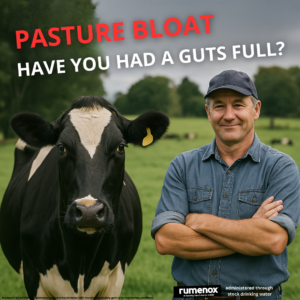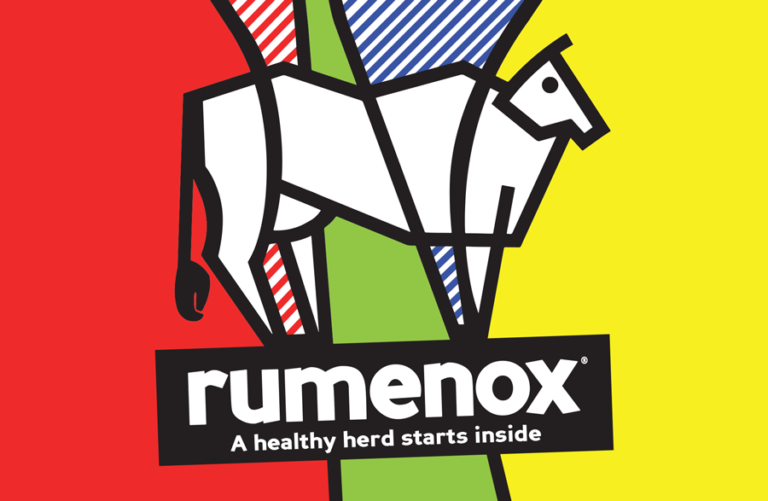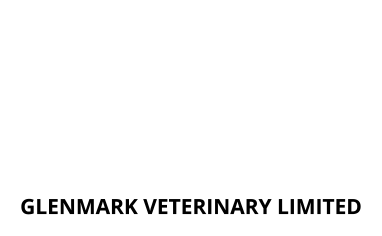You’re checking the herd one morning and all looks good… except for one cow off to the side. She may be constantly kicking her belly and have a horribly distended left flank—obvious tell-tale signs of bloat. “Bugger,” you think to yourself. If a healthy herd starts inside (in the rumen), it’s certainly not starting that way today.
What is bloat in cattle? In short, bloat occurs when gas accumulates excessively in the rumen and cannot escape, causing painful swelling.
What causes a cow to bloat? Often, it’s a combination of lush pasture, rapid fermentation, and irregular drinking patterns that disrupt normal rumen function.
Bloat is a common and exceedingly costly problem for New Zealand’s dairy farmers, affecting around 1-2% of cows nationwide. That might seem like a manageable amount, but the financial implications of losing a single cow—including the associated loss of production—quickly take a toll: $6,000, in fact. Multiply that across every herd in the country, and you can see the scale of the problem.
What to do when a cow is bloated?
The challenge with bloat is that while you might have a fair idea when it could happen, you never quite know. Cows don’t always drink regularly, and very little on wet days. Most bloat treatments in NZ are administered through stock drinking water; however, once cows stop drinking they’re particularly vulnerable to a bloat challenge, which can come on fast.
To combat the problem, farmers have resorted to a myriad of treatments—some more reactive in nature, such as stomach tubes, trocars, and even using a knife on the left flank (leading many to ask, “Where to stab a cow with bloat?” This is obviously a last-resort procedure and should only be undertaken by someone trained, or under veterinary advice). There are also more proactive measures, the most popular being bloated oil. Historically seen as the most cost-effective option for controlling pasture bloat, which is not the case anymore, the challenge with bloat oils is that they’re short-lived in the rumen (which begs the question of how cost-effective they really are) and, second, bloat oils offer no additional benefits beyond immediate relief and, third, Rumenox® is NOW less expensive than bloat oil.
How to prevent bloat in cattle
It’s for this reason that the science of bloat protection is now focusing less on short-term treatments like bloat oils and more on how to prevent bloat in cattle before it becomes a serious issue. After all, if you can prevent excess gas production in the rumen, you’re less likely to need quick-fix bloat solutions in the first place.
One product gaining wide acceptance among vets and feed suppliers is Rumenox®, a water-soluble additive that adjusts fermentation levels in the rumen. This results in a reduction in gas, decreasing the risk of bloat far longer than bloat oil. Unlike bloat oils, Rumenox® has a single dose rate regardless of the current bloat challenge, eliminating the need to constantly adjust rates according to the risk.
Added benefits—including ketosis support
Furthermore, you can help reduce on-farm costs as Rumenox® is now less expensive than bloat oils, even if you’re using lower rates of oil to treat a moderate bloat risk. For peace of mind protection that not only outperforms bloat oil but is now less expensive, click here to learn more about Rumenox® or find out where to buy.




